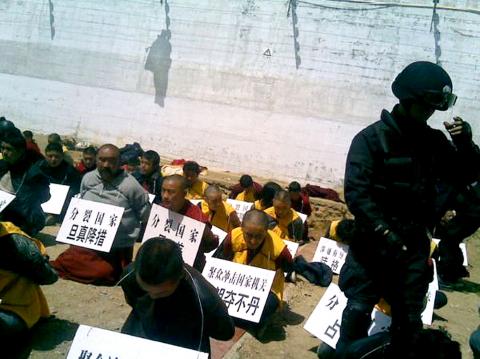Recently leaked footage of a crackdown by Chinese security forces in Tibet indicates that the level of repression against Tibetans appears to be much more serious than generally acknowledged by the international community.
A video posted on the exile Tibetan Web site TibetOnline.tv on Wednesday showed a raid by a Chinese SWAT team comprising about 100 People’s Armed Police (PAP) officers on what is believed to be Unit 2 of Dode Village, near the Sera monastery northeast of Lhasa.
The quality footage, which is believed to have been shot in 2008, displays an unprecedented show of force by Chinese authorities, with SWAT teams, accompanied by numerous dogs and an armored vehicle, assuming attack formation and aiming assault rifles at sleeping villagers. In all, four confused-looking men and one elderly woman are taken away. Each is forced to stare into the camera and provide details to the cameraman, who is presumably a PAP member.

Photo: AFP
Unlike previous unrest, such as the 1989 riots in Lhasa or the March 2008 incident, during which nervous and sometimes vengeful PAP officers were confronted with an emergency, the troops in the video are not responding to any immediate threat.
As of last evening, the 22-minute video appeared to have been taken offline. It has since emerged on YouTube.
The material follows the release on the citizen journalism Boxun Web site last week of eight photographs showing Tibetan prisoners being paraded by a large contingent of armed police in China’s Sichuan Province, also in 2008 or later.
The two releases have led analysts to conclude that someone in China, perhaps within the security apparatus, is leaking information to show the true scale of repression in Tibet and neighboring areas in China.
Reacting to the video, Dawa Tsering, chairman of the Tibet Religious Foundation of His Holiness the Dalai Lama — the de facto representative of the exiled government in Taiwan — said that the way in which Chinese treat Tibetans showed them to be a conquered and colonized people.
“Any Tibetan with a heart will never forget this humiliation, we will not forget how arrogant the Chinese are and the humiliation we went through,” he said. “We will remember this for generations to come and this memory will constantly remind us of what we should do.”
Former Regional Tibetan Youth Congress Taiwan president Tashi Tsering said he was not surprised by what Chinese police officers did to Tibetans.
“That’s how the Chinese Communist Party has always treated Tibetans,” Tashi said via telephone. “The Chinese always claim they respect human rights, but what they do is different from what they say. Taiwanese should know this and be very careful when dealing with China.”
He called on the international community to launch a probe into human rights violations in Tibet.
Additional reporting by Loa Iok-sin

Intelligence agents have recorded 510,000 instances of “controversial information” being spread online by the Chinese Communist Party (CCP) so far this year, the National Security Bureau (NSB) said in a report yesterday, as it warned of artificial intelligence (AI) being employed to generate destabilizing misinformation. The bureau submitted a written report to the Legislative Yuan in preparation for National Security Bureau Director-General Tsai Ming-yen’s (蔡明彥) appearance before the Foreign Affairs and National Defense Committee today. The CCP has been using cognitive warfare to divide Taiwanese society by commenting on controversial issues such as Taiwan Semiconductor Manufacturing Co’s (TSMC, 台積電) investments in the

HELPING HAND: The steering committee of the National Stabilization Fund is expected to hold a meeting to discuss how and when to utilize the fund to help buffer the sell-off The TAIEX plunged 2,065.87 points, or 9.7 percent, to close at 19,232.35 yesterday, the highest single-day percentage loss on record, as investors braced for US President Donald Trump’s tariffs after an extended holiday weekend. Amid the pessimistic atmosphere, 945 listed companies led by large-cap stocks — including Taiwan Semiconductor Manufacturing Co (TSMC, 台積電), Hon Hai Precision Industry Co (鴻海精密) and Largan Precision Co (大立光) — fell by the daily maximum of 10 percent at the close, Taiwan Stock Exchange data showed. The number of listed companies ending limit-down set a new record, the exchange said. The TAIEX plunged by daily maxiumu in just

INVESTIGATION: The case is the latest instance of a DPP figure being implicated in an espionage network accused of allegedly leaking information to Chinese intelligence Democratic Progressive Party (DPP) member Ho Jen-chieh (何仁傑) was detained and held incommunicado yesterday on suspicion of spying for China during his tenure as assistant to then-minister of foreign affairs Joseph Wu (吳釗燮). The Taipei District Prosecutors’ Office said Ho was implicated during its investigation into alleged spying activities by former Presidential Office consultant Wu Shang-yu (吳尚雨). Prosecutors said there is reason to believe Ho breached the National Security Act (國家安全法) by leaking classified Ministry of Foreign Affairs information to Chinese intelligence. Following interrogation, prosecutors petitioned the Taipei District Court to detain Ho, citing concerns over potential collusion or tampering of evidence. The

‘COMPREHENSIVE PLAN’: Lin Chia-lung said that the government was ready to talk about a variety of issues, including investment in and purchases from the US The National Stabilization Fund (NSF) yesterday announced that it would step in to staunch stock market losses for the ninth time in the nation’s history. An NSF board meeting, originally scheduled for Monday next week, was moved to yesterday after stocks plummeted in the wake of US President Donald Trump’s announcement of 32 percent tariffs on Taiwan on Wednesday last week. Board members voted to support the stock market with the NT$500 billion (US$15.15 billion) fund, with injections of funds to begin as soon as today. The NSF in 2000 injected NT$120 billion to stabilize stocks, the most ever. The lowest amount it